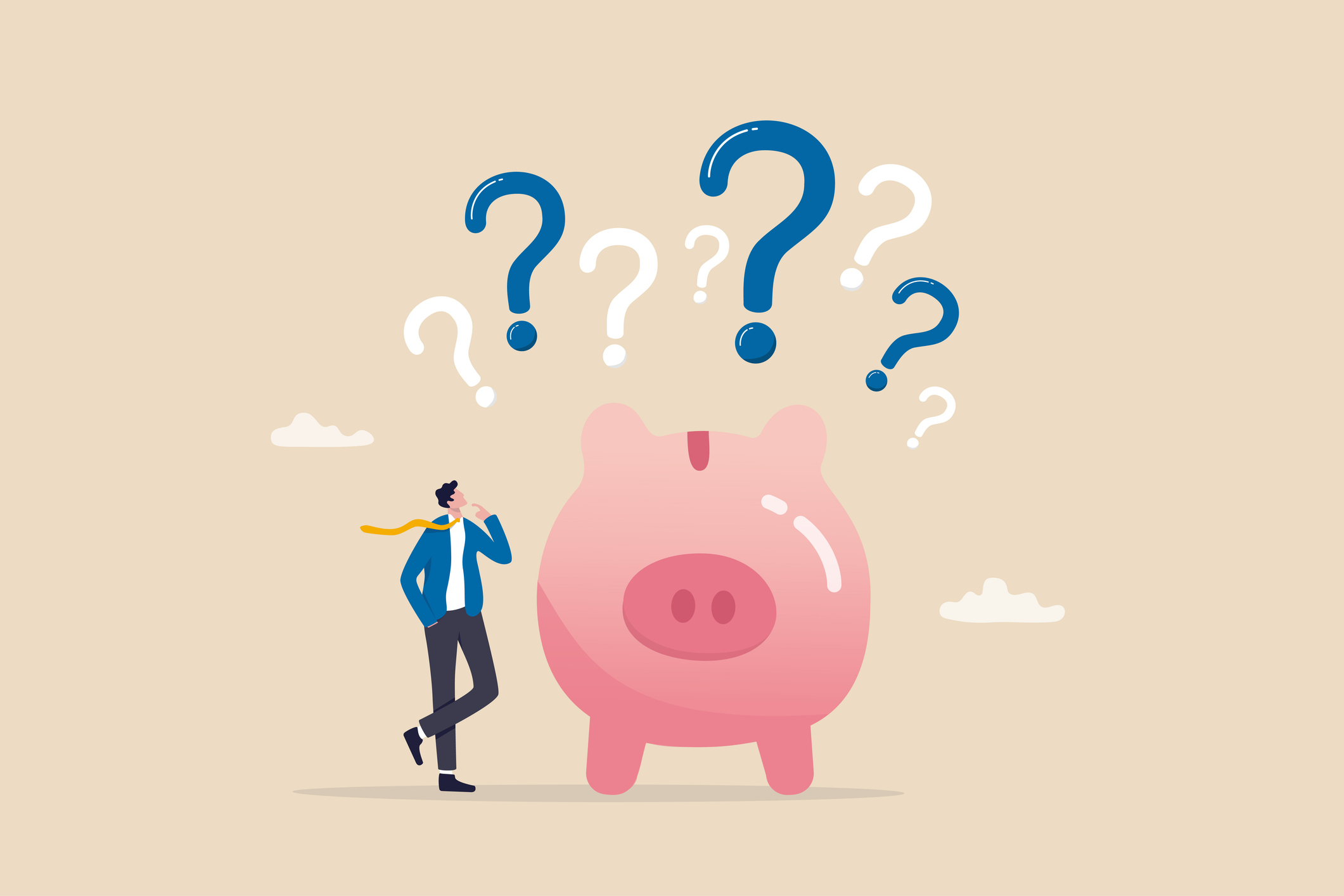Where to Deposit Your Social Security Check
If you receive Social Security checks, where you deposit them matters because it can help grow your earnings. See the best options.


Profit and prosper with the best of Kiplinger's advice on investing, taxes, retirement, personal finance and much more. Delivered daily. Enter your email in the box and click Sign Me Up.
You are now subscribed
Your newsletter sign-up was successful
Want to add more newsletters?

Delivered daily
Kiplinger Today
Profit and prosper with the best of Kiplinger's advice on investing, taxes, retirement, personal finance and much more delivered daily. Smart money moves start here.

Sent five days a week
Kiplinger A Step Ahead
Get practical help to make better financial decisions in your everyday life, from spending to savings on top deals.

Delivered daily
Kiplinger Closing Bell
Get today's biggest financial and investing headlines delivered to your inbox every day the U.S. stock market is open.

Sent twice a week
Kiplinger Adviser Intel
Financial pros across the country share best practices and fresh tactics to preserve and grow your wealth.

Delivered weekly
Kiplinger Tax Tips
Trim your federal and state tax bills with practical tax-planning and tax-cutting strategies.

Sent twice a week
Kiplinger Retirement Tips
Your twice-a-week guide to planning and enjoying a financially secure and richly rewarding retirement

Sent bimonthly.
Kiplinger Adviser Angle
Insights for advisers, wealth managers and other financial professionals.

Sent twice a week
Kiplinger Investing Weekly
Your twice-a-week roundup of promising stocks, funds, companies and industries you should consider, ones you should avoid, and why.

Sent weekly for six weeks
Kiplinger Invest for Retirement
Your step-by-step six-part series on how to invest for retirement, from devising a successful strategy to exactly which investments to choose.
Some Social Security recipients recently had to find a new way to receive their payments. The Social Security Administration phased out paper checks starting September 30, opting to send payments only electronically, except as a last resort for recipients who have no other option.
Whether you've already been receiving Social Security payments by direct deposit or if you'll be starting to receive them that way soon, it's worth taking time to consider where your payments are being deposited. This decision could earn you valuable interest — or cost you in fees and missed opportunity.
That's because some bank accounts offer generous APYs, helping you earn more money and stay ahead of inflation, while some come with high fees, which can reduce your earnings. I'll show you which options are best for optimizing your earnings.
From just $107.88 $24.99 for Kiplinger Personal Finance
Become a smarter, better informed investor. Subscribe from just $107.88 $24.99, plus get up to 4 Special Issues

Sign up for Kiplinger’s Free Newsletters
Profit and prosper with the best of expert advice on investing, taxes, retirement, personal finance and more - straight to your e-mail.
Profit and prosper with the best of expert advice - straight to your e-mail.
Outpace inflation with high-yield savings accounts
One smart solution is to deposit your Social Security payments directly into a high-yield savings account. You can find high-yield savings accounts (HYSA) that'll earn you over 4.00% APY, with no account fees or minimums.
This option works best if you treat your Social Security earnings as supplemental income, since you can have it sit and earn higher interest until you need to use the funds.
What I like best about high-yield savings accounts is their flexibility. Unlike CDs, where you have to pledge your money for a specified term, you can access your high-yield savings account anytime you need.
Considerations: Many HYSAs are from online banks, not brick-and-mortar, so you would not have the option of stopping into a local location to problem-solve. If you need to use the funds, you also have to contend with transferring them to, say, a checking account, which doesn't happen instantaneously, so you have to plan.
If you're concerned about signing up with an online bank for cash access, I recommend also opening a checking account with that online bank. Look for checking accounts that offer debit cards, which allow you quick access to your cash.
And if you're interested in signing up for a HYSA, use this Bankrate tool to find the best options quickly:
Try a savings account with checking account flexibility

Another option to consider is a money market account. What makes them unique is that you'll earn an APY that rivals some of the best high-yield savings accounts, but you have more options to access your cash than you do with a HYSA.
Most money market accounts come with debit card privileges. Some also offer check-writing capabilities. This way, you don't have to contend with paying ATM fees or waiting for transfers if you need access to your money.
Considerations: Many money market accounts have monthly transaction limits. If you exceed them, the bank can decide to decline the transaction or approve it and charge you a fee.
As such, only use a money market account if you don't plan to make many purchases on the account. Another thing to consider is that these accounts have monthly fees if you don't meet the minimum balance requirement – think $1,000 or more.
Can I use a local bank?

If you don't want to give up banking with your local branch, I don't blame you. There's a personalization there that's hard to come by with online banks. Plus, it can be a great undertaking to switch your bank accounts.
By that same token, many brick-and-mortar banks don't offer the same level of returns you can receive with an online bank. For example, I checked the savings rate with my local PNC Bank. For balances $1,000-$2,499, I would earn 0.02% APY. Anything above that earns me 0.03% APY.
By comparison, Newtek Bank has a high-yield savings account that earns 4.35% APY. Choosing this option, especially if you have $10,000 in the bank or more, ensures you earn hundreds of dollars in interest annually. So, if you do decide to go with a traditional bank, look for one that offers high-yield savings accounts, or else accept that you'll lose out on some money.
Considerations: Sometimes, it makes sense to stay with your local branch. If you have an aging parent who relies on a personal banker to help them with bill payments and budgeting, then I wouldn't recommend switching.
Some local banks also offer savings account bonuses, where you can earn hundreds of dollars for opening an account, setting up direct deposits of your Social Security check and keeping that account open for at least a few months. Use this in the interim if you can, but know eventually you'll need to switch to a savings account with a higher APY to keep your earnings growing.
The bottom line on where to deposit your Social Security check
With almost all Social Security recipients receiving their checks electronically, choosing the right bank account is vital. By selecting one that offers no account fees or minimums, with higher APYs, you're allowing your money to continue to grow to outpace inflation.
This is why high-yield savings accounts continue to be the best option to consider. However, if you want more flexibility in how you access your cash, money market accounts give you more ways to do so, while also earning far more than your local branch will pay you.
Related content
Profit and prosper with the best of Kiplinger's advice on investing, taxes, retirement, personal finance and much more. Delivered daily. Enter your email in the box and click Sign Me Up.

Sean is a veteran personal finance writer, with over 10 years of experience. He's written finance guides on insurance, savings, travel and more for CNET, Bankrate and GOBankingRates.
-
 Quiz: Do You Know How to Avoid the "Medigap Trap?"
Quiz: Do You Know How to Avoid the "Medigap Trap?"Quiz Test your basic knowledge of the "Medigap Trap" in our quick quiz.
-
 5 Top Tax-Efficient Mutual Funds for Smarter Investing
5 Top Tax-Efficient Mutual Funds for Smarter InvestingMutual funds are many things, but "tax-friendly" usually isn't one of them. These are the exceptions.
-
 AI Sparks Existential Crisis for Software Stocks
AI Sparks Existential Crisis for Software StocksThe Kiplinger Letter Fears that SaaS subscription software could be rendered obsolete by artificial intelligence make investors jittery.
-
 Quiz: Do You Know How to Avoid the 'Medigap Trap?'
Quiz: Do You Know How to Avoid the 'Medigap Trap?'Quiz Test your basic knowledge of the "Medigap Trap" in our quick quiz.
-
 We Retired at 62 With $6.1 Million. My Wife Wants to Make Large Donations, but I Want to Travel and Buy a Lake House.
We Retired at 62 With $6.1 Million. My Wife Wants to Make Large Donations, but I Want to Travel and Buy a Lake House.We are 62 and finally retired after decades of hard work. I see the lakehouse as an investment in our happiness.
-
 Social Security Break-Even Math Is Helpful, But Don't Let It Dictate When You'll File
Social Security Break-Even Math Is Helpful, But Don't Let It Dictate When You'll FileYour Social Security break-even age tells you how long you'd need to live for delaying to pay off, but shouldn't be the sole basis for deciding when to claim.
-
 One of the Most Powerful Wealth-Building Moves a Woman Can Make: A Midcareer Pivot
One of the Most Powerful Wealth-Building Moves a Woman Can Make: A Midcareer PivotIf it feels like you can't sustain what you're doing for the next 20 years, it's time for an honest look at what's draining you and what energizes you.
-
 I'm a Wealth Adviser Obsessed With Mahjong: Here Are 8 Ways It Can Teach Us How to Manage Our Money
I'm a Wealth Adviser Obsessed With Mahjong: Here Are 8 Ways It Can Teach Us How to Manage Our MoneyThis increasingly popular Chinese game can teach us not only how to help manage our money but also how important it is to connect with other people.
-
 Looking for a Financial Book That Won't Put Your Young Adult to Sleep? This One Makes 'Cents'
Looking for a Financial Book That Won't Put Your Young Adult to Sleep? This One Makes 'Cents'"Wealth Your Way" by Cosmo DeStefano offers a highly accessible guide for young adults and their parents on building wealth through simple, consistent habits.
-
 Global Uncertainty Has Investors Running Scared: This Is How Advisers Can Reassure Them
Global Uncertainty Has Investors Running Scared: This Is How Advisers Can Reassure ThemHow can advisers reassure clients nervous about their plans in an increasingly complex and rapidly changing world? This conversational framework provides the key.
-
 5 Ronald Reagan Quotes Retirees Should Live By
5 Ronald Reagan Quotes Retirees Should Live ByThe Nation's 40th President's wit and wisdom can help retirees navigate their financial and personal journey with confidence.